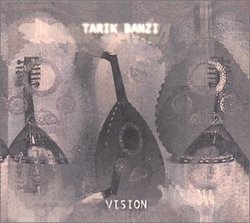Album Description"Vision" Improvisations on the Oud, A Collection by Moroccan Oudist: Tarik Banzi The oud (pronounced like ?wooed? without the ?w?) is the quintessential classical Arabic musical instrument. It elicits a warm response even from Western musical ears unaccustomed to the intricacy and subtlety of this ten or eleven-stringed Middle Eastern forerunner of the European lute (the word ?lute? is actually derived from the Arabic ?al-?ud?). It is particularly appropriate for Tarik to showcase the oud because he, like the instrument before him, passed from North Africa to the West via Spain. Tarik is originally from Tetouan, Morocco, which is in the northernmost point of Africa, near Spain; he lived for many years in Spain, where he completed his studies in Fine Arts. He later moved to the USA where he formed the multicultural musical group, Al-Andalus. As Tarik says, ?I grew up listening to and playing all sorts of music, both the popular and traditional music of Morocco, Spain and America.?Yet, his Moroccan roots remain very strong. What is interesting about Tarik is that he resists creating more fusion music. Instead, he composes music that is closer to the classical Arabic tradition?as opposed to the more flamboyantly mixed music popular in World Beat circles. Nonetheless, his music is a hybrid of East and West. It is also a hybrid of North and South, due to the many African influences running through Moroccan music and culture. Thanks to the richness of this musical heritage, Tarik easily crosses musical borders while retaining the best of his traditional musical training. As Tarik puts it, ?Throughout my life I have resisted such boundaries. At the same time I appreciate and embrace my rich heritage as a stepping stone to creating new art, new music, new beauty.? Such an encounter between East and West might, on the surface, seem forbidding: Arabic classical music is based on intricate meters, a complicated maqam system (something like a modal structure), microtones, and other musical elements unfamiliar to Western audiences. Yet, there is also a strong Arab musical tradition of complex improvisation and ornamentation (taqasim) around the melody. This is something Westerners can appreciate. It is this aspect of the tradition that Tarik brings to the forefront in his music. In fact, Tarik has taken the spirit of improvisation in some unique directions. Most startling to those familiar with Arab music will be Tarik?s innovative use of an electric oud on several tracks. The sound is quite unique and illustrates perfectly his desire to push the boundaries of the traditional. Tarik?s unique musical creations for the oud beautifully illustrate his contemporary approach to music, an approach which places greatest emphasis on innovation within tradition.Most important of all, Tarik is passionate about the music and intent on creating soft, lovely, haunting melodies. ?Music has always been a way of connecting to a spiritual center and creating beauty,? is how Tarik explains his purpose. He has succeeded admirably. After listening to this CD, I think you will agree with me that Tarik uses the oud to create a beautiful, warm, subtle, and profoundly meditative music. Dr. David McMurrayProfessor of Anthropology, Oregon State University


 Track Listings (10) - Disc #1
Track Listings (10) - Disc #1